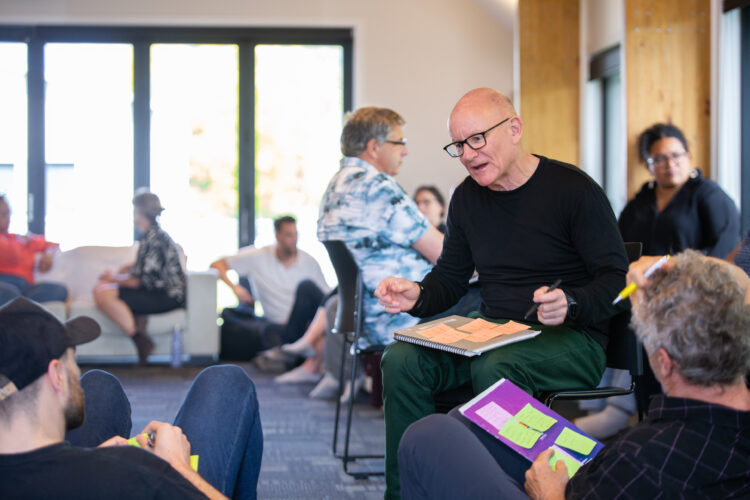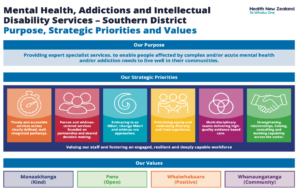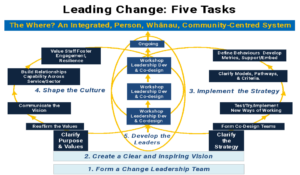
March 26th, 2025
Mental Health, Addictions and Intellectual Disability Services
Over the last decade, we have worked with senior clinicians and leaders across the West
Coast and Canterbury District Health systems. It is very humbling to be involved as
consultants in this work. The system is held together by networks of committed staff
working under high pressure and contributing over and above the formal requirements of
their jobs. More recently, we have supported the Southern Specialist Mental Health and
Addictions Service as it responds to major sector changes and moves toward a more
integrated way of operating. Here is a little of the story of the change journey we took with
them.
To orientate the change process, we began by facilitating a series of codesign workshops
explicitly orientated to the “balcony” task of clarifying vision. We opened these workshops
with karakia and mindfulness practices to help create a space where people could leave
their day-to-day demands behind and attend to the bigger-picture work of vision and
change. These workshops became more effective as we included front-line clinicians and
leaders. On several occasions, we had around 35 people involved. The product of these
workshops was the Purpose, Strategic Priorities and Values graphic shown in Figure 1
below.
Figure 1

The work on purpose, strategy and values was part of a broader change process of creating
“an integrated, person, whānau and community-centred system”. To help guide the
process, we developed the “Leading Change: Five Tasks” model shown below in Figure 2.
Figure 2

The formation of the co-design teams and the creation of the vision shown in Figure One
were Tasks 1 and 2 in this model. The Five Task model was referenced at each workshop to
reconnect people with the broader change process and support “balcony” thinking. With the vision formed, the co-design workshops were used to develop projects to address Tasks
3 and 4 of the Five Task model. The projects were developed and supported in the co-design workshops and then implemented across the service and sector.
The Leadership Lab team provided coaching for the project leads and facilitation support for the projects. Front-line project workshops were framed around the Purpose, Strategic
Priorities and Values (Figure One). This served to communicate the vision and provide a
framework for developing new ways of working to support strategy implementation and
culture change.
About a year into our engagement the process really gained momentum. The co-design
workshops with the core change leadership team became more energised and a range of
well supported change initiatives emerged across the service and sector. These included
work on pathways clarification, MDT processes and relationship building across the broader sector. We were particularly struck by a statement by one of the change team participants who had initially been very resistant. She spoke about her initial scepticism but said, “I’ve come full circle and feel part of something meaningful. I can see the positive impact it’s having on my service team and on our relationships across the service in general”.
Our engagement concluded at the end of 2024. About the same time the General Manager
who was a key sponsor of the process retired. As 2025 begins there are a numerous change
initiatives in train. These cover both the strategy implementation and culture shaping
aspects of Figure Two above. The initiatives are led by line managers and well supported by front-line staff. The following comments give an indication of the impact of the change
process.
“After what felt like treading water for many years, I finally feel that we have a direction. We wouldn’t be here if it wasn’t for Leadership Lab and for the organisation investing in their people leaders.”
“Our team [has] a renewed sense of purpose and a clear direction for the coming months. They recognise the challenges ahead but express confidence in their ability to work together to improve mental health services across the Southern Region.”
“The Purpose and Strategic priorities and the wider support that Leadership lab have provided both individually and with DLT and SLT’s feels really good to me. It’s also something that we’re taking to the wider NGO sector now as a basis for greater collaboration. And now we can all work more effectively. So some good work in that space.”
“We’ve talked about a platform for moving forward and the work we’ve been doing with Leadership Lab has been a really important part of that platform This work is a journey, not a destination. But despite all the challenges that we have across the sector this Directorate feels in a strong position because of this work. So it’s all good stuff.”
This feels to us like the start of a successful change process in a really challenging
environment. The holistic approach outlined in Figure Two is part of the reason for its
success. Many change processes emphasise strategy implementation, or culture shaping or
leadership development individually. In this process we were able to address aspects of all three simultaneously and to do so in the context of the Purpose, Strategic Priorities and
Values shown in Figure One. Nothing would have been achieved however, without the
commitment, energy and expertise of the managers, clinicians and staff. The co-design
process was able to draw on that expertise and importantly strengthen the relationships
between them. Our hope is that the strengthened relationships and the initiatives now
underway will sustain the journey to a more integrated, person, whānau and community-
centred system.
This piece was written by Pete Cammock, Leadership Lab Director.
Team members: Pete Cammock, Moira Mallon and Ross Denton
You can read more stories of impact as well as thought-provoking pieces from across our Leadership Lab ecosystem by signing up for this monthly pānui (see bottom of www.leadershiplab.co.nz) or by connecting with us on our Leadership Lab LinkedIn and Facebook . Thanks heaps for your interest.

March 26th, 2025
Mental Health, Addictions and Intellectual Disability Services
Over the last decade, we have worked with senior clinicians and leaders across the West
Coast and Canterbury District Health systems. It is very humbling to be involved as
consultants in this work. The system is held together by networks of committed staff
working under high pressure and contributing over and above the formal requirements of
their jobs. More recently, we have supported the Southern Specialist Mental Health and
Addictions Service as it responds to major sector changes and moves toward a more
integrated way of operating. Here is a little of the story of the change journey we took with
them.
To orientate the change process, we began by facilitating a series of codesign workshops
explicitly orientated to the “balcony” task of clarifying vision. We opened these workshops
with karakia and mindfulness practices to help create a space where people could leave
their day-to-day demands behind and attend to the bigger-picture work of vision and
change. These workshops became more effective as we included front-line clinicians and
leaders. On several occasions, we had around 35 people involved. The product of these
workshops was the Purpose, Strategic Priorities and Values graphic shown in Figure 1
below.
Figure 1

The work on purpose, strategy and values was part of a broader change process of creating
“an integrated, person, whānau and community-centred system”. To help guide the
process, we developed the “Leading Change: Five Tasks” model shown below in Figure 2.
Figure 2

The formation of the co-design teams and the creation of the vision shown in Figure One
were Tasks 1 and 2 in this model. The Five Task model was referenced at each workshop to
reconnect people with the broader change process and support “balcony” thinking. With the vision formed, the co-design workshops were used to develop projects to address Tasks
3 and 4 of the Five Task model. The projects were developed and supported in the co-design workshops and then implemented across the service and sector.
The Leadership Lab team provided coaching for the project leads and facilitation support for the projects. Front-line project workshops were framed around the Purpose, Strategic
Priorities and Values (Figure One). This served to communicate the vision and provide a
framework for developing new ways of working to support strategy implementation and
culture change.
About a year into our engagement the process really gained momentum. The co-design
workshops with the core change leadership team became more energised and a range of
well supported change initiatives emerged across the service and sector. These included
work on pathways clarification, MDT processes and relationship building across the broader sector. We were particularly struck by a statement by one of the change team participants who had initially been very resistant. She spoke about her initial scepticism but said, “I’ve come full circle and feel part of something meaningful. I can see the positive impact it’s having on my service team and on our relationships across the service in general”.
Our engagement concluded at the end of 2024. About the same time the General Manager
who was a key sponsor of the process retired. As 2025 begins there are a numerous change
initiatives in train. These cover both the strategy implementation and culture shaping
aspects of Figure Two above. The initiatives are led by line managers and well supported by front-line staff. The following comments give an indication of the impact of the change
process.
“After what felt like treading water for many years, I finally feel that we have a direction. We wouldn’t be here if it wasn’t for Leadership Lab and for the organisation investing in their people leaders.”
“Our team [has] a renewed sense of purpose and a clear direction for the coming months. They recognise the challenges ahead but express confidence in their ability to work together to improve mental health services across the Southern Region.”
“The Purpose and Strategic priorities and the wider support that Leadership lab have provided both individually and with DLT and SLT’s feels really good to me. It’s also something that we’re taking to the wider NGO sector now as a basis for greater collaboration. And now we can all work more effectively. So some good work in that space.”
“We’ve talked about a platform for moving forward and the work we’ve been doing with Leadership Lab has been a really important part of that platform This work is a journey, not a destination. But despite all the challenges that we have across the sector this Directorate feels in a strong position because of this work. So it’s all good stuff.”
This feels to us like the start of a successful change process in a really challenging
environment. The holistic approach outlined in Figure Two is part of the reason for its
success. Many change processes emphasise strategy implementation, or culture shaping or
leadership development individually. In this process we were able to address aspects of all three simultaneously and to do so in the context of the Purpose, Strategic Priorities and
Values shown in Figure One. Nothing would have been achieved however, without the
commitment, energy and expertise of the managers, clinicians and staff. The co-design
process was able to draw on that expertise and importantly strengthen the relationships
between them. Our hope is that the strengthened relationships and the initiatives now
underway will sustain the journey to a more integrated, person, whānau and community-
centred system.
This piece was written by Pete Cammock, Leadership Lab Director.
Team members: Pete Cammock, Moira Mallon and Ross Denton
You can read more stories of impact as well as thought-provoking pieces from across our Leadership Lab ecosystem by signing up for this monthly pānui (see bottom of www.leadershiplab.co.nz) or by connecting with us on our Leadership Lab LinkedIn and Facebook . Thanks heaps for your interest.


